#international trade and development
Explore tagged Tumblr posts
Text
having men approach me at work and having to call the cops at work bcs a man was stalking his ex at our shop and hearing abt how my coworker was stalked at the mall yesterday and it's all so paradoxical to me that this all happened in the span of a week in a summer that I'm very much trying to embrace my girlhood in. anyways
#like its so interesting to me that#im finally learning to embrace femininity and loving being a girl and#enjoying things like the barbie movie!! and taylor swift!! and acotar and throne of glass#and like at the taylor concert realizing that trading friendship bracelets w other girlies is just like.#girlies overcoming their internalized fear and hatred of other women in a safe space like the taylor concert#all this happens while im constantly reminded that real life men are and always will be kind of vile and even if they think youre attractive#its usually with their self interests in mind.#they will never top the romantic fantastical shit that a fictional man could say#idk. maybe this is my way of saying ive developed standards#yk?
4 notes
·
View notes
Text
ok last week my therapist asked me what I liked ABT Brits/British history and I told him and he was like "u know they were problematic too right? They stole stuff."
Oh jeez I didn't know or consider that. should I toss out my degree? Should we call Stuart hall?
#The short answer is their attempts to manage and develop a central state apparatus while encouraging free trade and individualistic cptlism#Their particular internal contradictions and rationalizations#The scientific bourgeoisie#their attachment to animals#The arts and crafts movement and underlying ideology#And ofc their weirdly ubiquitous love of animals...??
1 note
·
View note
Text
ACCI Empowers Women and Youths with Skills Training to Boost Self-Reliance, Economic Growth
By Naija247news Business Desk | Abuja | May 13, 2025 The Abuja Chamber of Commerce and Industry (ACCI) has intensified efforts to tackle unemployment and economic inequality by training hundreds of women and youths in digital technology, vocational skills, and entrepreneurial development aimed at strengthening their economic self-reliance and curbing insecurity. Speaking to the News Agency of…
#ACCI Training#Digital Skills Nigeria#Entrepreneurship Development#FCT Economic Development#Gender Inclusion#International Trade#Nigeria SME Growth#Vocational Training Abuja#Women Empowerment Nigeria#Youth Skills Training
0 notes
Text
पीएम मोदी से मिलने दिल्ली से केरल पहुंचे शशि थरूर
नई दिल्ली। प्रधानमंत्री नरेंद्र मोदी (PM Modi Kerala visit) 2 मई को सुबह 11 बजे केरल के तिरुवनंतपुरम में 8,900 करोड़ रुपये की लागत से बने ‘विझिंजम इंटरनेशनल डीपवाटर मल्टीपर्पज सीपोर्ट’ का उद्घाटन करेंगे। इसके लिए पीएम मोदी केरल पहुंचे हैं। इस बीच कांग्रेस सांसद शशि थरूर ने ‘X’ (पूर्व में ट्विटर) पर एक पोस्ट में बताया कि दिल्ली हवाई अड्डे की अव्यवस्थाओं के बावजूद वे समय पर तिरुवनंतपुरम पहुंचे,…
#deep sea port India#Delhi airport delays#India trade port#Indian maritime news#Kerala development#Kerala port news#Modi in Thiruvananthapuram#Modi infrastructure push#Modi Kerala speech#Modi port inauguration#Modi Vizhinjam port project#PM Modi Kerala visit#Shashi Tharoor PM Modi#Shashi Tharoor welcomes Modi#Thiruvananthapuram news#Vizhinjam International Seaport#Vizhinjam Port inauguration#Vizhinjam shipping hub#Vizhinjam transshipment port#Vizhinjam updates#पीएम मोदी केरल द
0 notes
Text
Strengthening Travel Data Collection in Eswatini: Global Insights and Local Action from ITC Day 2 Training

Introduction
On April 9, 2025, the International Trade Centre (ITC) hosted the second day of its specialized training in Eswatini, focusing on strengthening the collection and integration of travel service data. The training, part of a broader initiative to foster trade integration in Africa, emphasized the importance of accurate travel statistics in compiling a country’s Balance of Payments (BoP) and making informed policy decisions.
Understanding the Complexity of Travel Data
Travel services stand out from other services in international trade because they involve direct interactions between travelers and service providers. Capturing this data accurately is a challenge for many developing countries due to high costs, technical complexities, and fragmented data sources.
The ITC highlighted multiple data collection methods, including:
Personal and Household Surveys
Enterprise and Establishment Surveys
International Transactions Reporting Systems (ITRS)
Administrative Records (e.g., immigration, health, and education)
Operational Data from payment cards and mobile networks
Best Practices from Around the World
Participants explored successful case studies such as Algeria’s detailed ITRS classification system, which includes over 20 specific travel transaction categories. Italy’s visitor survey methodology was also presented, offering detailed expenditure breakdowns and capturing valuable insights into tourist behavior. Spain and Germany demonstrated how integrating mobile data and credit card transactions can enhance the granularity of travel statistics.
Local Contributions and Presentations
Three key national institutions shared valuable insights during the workshop:
Central Bank of Eswatini – Presented by Khetsiwe Dlamini-Maziya Highlighted legal frameworks, monthly travel service data from ITRS, and challenges such as misclassification. Emphasized cooperation with the Central Statistical Office (CSO) and the importance of seamless data sharing.
Eswatini Tourism Authority (ETA) – ETA Surveys & Stats Presentation Provided an overview of tourism-related surveys, including the Exit Survey, Day Visitor Survey, and Event Impact Surveys. These tools are central to measuring tourist behavior and destination performance.
Central Statistical Office (CSO) – Presented by Philile Mdluli Focused on hotel and accommodation statistics, data collection frequency, and challenges in working with tourism establishments. Noted issues like high staff turnover and lack of standardized data systems, proposing both short- and long-term digital solutions.
These presentations emphasized the critical role of local data collection and inter-agency cooperation in enhancing the quality and reliability of tourism statistics.
Challenges and Solutions
Key issues identified included the misclassification of travel expenses, timing mismatches between payment and service delivery, and low response rates in enterprise and household surveys.
Solutions discussed included:
Enhancing the granularity of ITRS codes
Leveraging mobile tracking and payment data
Improving survey designs and interviewer training
Strengthening confidentiality and legal frameworks
Encouraging inter-agency collaboration
Data Integration and Coordination
A strong focus was placed on integrating multiple data sources to avoid duplication and ensure completeness. The training encouraged structured cooperation between statistical offices, financial institutions, and telecom providers. Formal agreements and shared protocols were highlighted as essential tools.
Eswatini’s Path Forward
As Eswatini works to improve its travel data infrastructure, the ITC training provided practical tools and exposure to international best practices. The national presentations reinforced the country's existing strengths and pointed to opportunities for innovation in legal, technical, and operational areas.
Conclusion
Day 2 of the ITC training reinforced the critical role of accurate travel data in national statistics. Through better methodologies, inter-agency cooperation, and the integration of modern data technologies, Eswatini is well positioned to improve tourism intelligence and support sustainable growth in the sector.
#Travel Data#Tourism Statistics#International Trade#Data Collection#Economic Development#Training & Capacity Building#Eswatini#Southern Africa#Africa Trade#SADC Region#nternational Trade Centre (ITC)#Central Bank of Eswatini#Eswatini Tourism Authority (ETA)#Central Statistical Office (CSO)#Government Partnerships#Balance of Payments (BoP)#ITRS (International Transactions Reporting System)#Survey Methods#Administrative Data#Mobile Data Analytics#ITC Training 2025#Travel Data Workshop#Tourism Development Events#Inter-agency Collaboration#Policy Making#Tourism Intelligence#Digital Transformation#Data-Driven Development
0 notes
Text
When It Comes to the Economy, Does Trump Have Musk’s Pain Tolerance?
The stock market today was full of bad news for both President Trump and Elon Musk. Markets around the world had their worst day of the year one day after Trump declined to rule out the possibility that his trade policies, including the aggressive tariffs he wants to put on trading partners like Canada and Mexico, could cause a recession. That could be a foreboding political sign for a president…
#Automobiles#Customs (Tariff)#Donald J#Elon#Foreign Aid#Government Efficiency Department (US)#International Trade and World Market#Marco#Musk#Republican Party#Rubio#Social media#Stocks and Bonds#Tesla Motors Inc#Trump#United States Agency for International Development#United States Economy#United States Politics and Government#X (Formerly Twitter)
0 notes
Text
Job Opportunity: Chief Trade Finance Operations Officer at the African Development Bank (Abidjan)! - March 2025
The African Development Bank (AfDB) is seeking a highly skilled and experienced Chief Trade Finance Operations Officer to join their Trade Finance Division in Abidjan, Côte d’Ivoire! If you have a strong background in trade finance, leadership experience, and a passion for driving economic growth in Africa, this is an excellent opportunity for you. About the African Development Bank: The AfDB…

View On WordPress
#Abidjan Jobs#africa#African Development Bank#Banking Jobs#Development Jobs#finance#Finance Jobs#International Jobs#investing#Job Opportunity#Leadership Jobs#news#politics#Trade Finance#Zimbabwe Jobs
0 notes
Text
Mongolia to host next UN conference on sustainable land management
Press Release – 21 February 2025 – Sustainable land management & restoration Bonn, 21 February 2025 – The Government of Mongolia and the United Nations Convention to Combat Desertification (UNCCD) have signed an agreement paving the way for the 17th session of the Convention’s Conference of the Parties (COP17) in Ulaanbaatar in 2026. COP17 will bring together UNCCD’s 197 Parties in a crucial…
0 notes
Text
Regional Power Play: Hydro Deal Promises Growth for Bhutan, Nepal, India, and Bangladesh Amid Rising Challenges
For the past few years, the countries of Bhutan, Bangladesh, India and Nepal have been slowly working towards cross-border energy trade. On 3 October, this cooperation achieved a major milestone. Bangladesh’s new regime signed a tripartite agreement to import 40 megawatts (MW) of hydropower from Nepal, via Indian territory. The hydropower potential of Nepal and Bhutan, estimated to be more than…
#Bangladesh#Bhutan#cross-border energy trade#Druk Green Power Corporation Limited#Economic Co-operation and Development#IEX#India#International Energy Agency
0 notes
Text
#greg grenda#business development#client relations#international trade#performance optimization#sales executive
0 notes
Text
Where Global Governance Went Wrong—And How To Fix It
International Agreements Have Not Balanced Our Freedoms In The Way That They Should.
— April 28, 2024 | Foreign Policy | By Joseph E. Stiglitz
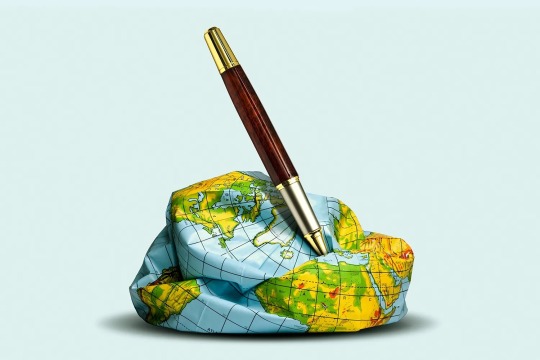
Matt Chase Illustration For Foreign Policy
Global Governance, Never Really Settled, has recently been having an especially hard time. Everyone believes in a rules-based system, but everyone wants to make the rules and dislikes it when the rules work against them, saying that they infringe on their sovereignty and their freedom. There are deep asymmetries, with the powerful countries not only making the rules but also breaking them almost at will, which raises the question: Do we even have a rules-based system, or is it just a facade? Of course, in such circumstances, those who break the rules say they only do so because others are, too.
The current moment is a good illustration. It is the product of longstanding beliefs and power relations. Under this system, industrial subsidies were a no-no, forbidden (so it was thought) not just by World Trade Organization rules, but also by the dictates of what was considered sound economics. “Sound economics” was that set of doctrines known as neoliberal economics, which promised growth and prosperity through, mostly, supposedly freeing the economy by allowing so-called free enterprise to flourish. The “liberal” in neoliberalism stood for freedom and “neo” for new, suggesting that it was a different and updated version of 19th-century liberalism.
In fact, it was neither really new nor really liberating. True, it gave firms more rights to pollute, but in doing so, it took away the freedom to breathe clean air—or in the case of those with asthma, sometimes even the most fundamental of all freedoms, the freedom to live.
“Freedom” meant freedom for the monopolists to exploit consumers, for the monopsonists (the large number of firms that have market power over labor) to exploit workers, and freedom for the banks to exploit all of us—engineering the most massive financial crisis in history, which required taxpayers to fork out trillions of dollars in bailouts, often hidden, to ensure that the so-called free enterprise system could survive
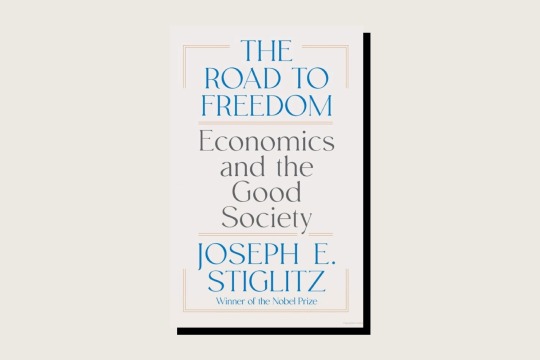
This essay is adapted from the book The Road to Freedom: Economics and the Good Society by Joseph E. Stiglitz, W.W. Norton, April 2024
The promise that this liberalization would lead to faster growth from which all would benefit never materialized. Under these doctrines that have prevailed for more than four decades, growth has actually slowed in most advanced countries. For instance, real growth in GDP per capita (average percent increase per annum) according to data compiled by the St. Louis Fed, was 2.5% from 1960 to 1990, but slowed to 1.5% from 1990 to 2018. Instead of trickle-down economics, where everyone would benefit, we had trickle-up economics, where the top 1 percent and especially the top 0.1 percent, got a larger and larger slice of the pie.
These are illustrations of British political theorist Isaiah Berlin’s dictum that “total liberty for wolves is death to the lambs”; or, as I have sometimes put it less gracefully, freedom for some has meant the unfreedom of others—their loss of freedom.
Just as individuals rightly cherish their freedom, countries do, too, often under the name “sovereignty.” But while these words are easily uttered, there is too little thought about their deeper meanings. Economics has weighed into the debate about what freedom and sovereignty mean, with John Stuart Mill’s contribution in the 19th century (On Liberty), and Milton Friedman’s and Friedrich Hayek’s works in the mid-20th (Capitalism and Freedom and The Road to Serfdom).
But contrary to what Hayek and Friedman asserted, free and unfettered markets do not lead to efficiency and the well-being of society; that should be obvious to anyone looking around. Just think of the inequality crisis, the climate crisis, the opioid crisis, the childhood diabetes crisis, or the 2008 financial crisis. These are crises created by the market, exacerbated by the market, and/or crises which the market hasn’t been able to deal with adequately.
Economic theorists (including me) have shown that whenever there is imperfect information or imperfect markets (that is to say, always), there is a presumption that markets are not efficient. Even a very little bit of imperfection can have big effects.
The problem is that much of the global economic architecture designed over recent decades has been based on neoliberalism—the kinds of ideas that Hayek and Friedman put forward. The system of rules that evolved from there must be fundamentally rethought.
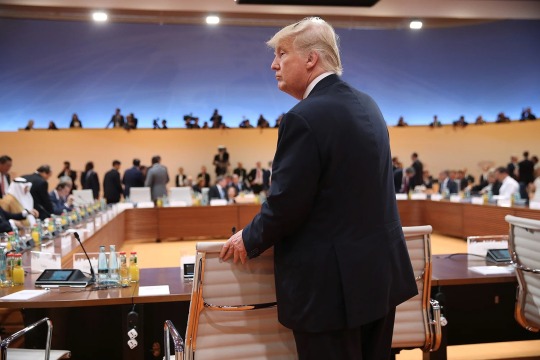
U.S. President Donald Trump arrives at the G-20 economic summit in Hamburg, Germany, on July 8, 2017. Sean Gallup/Getty Images
From An Economist’s Perspective, Freedom Is The “Freedom To Do,” meaning the size of the opportunity set of what a person can do, or the range of the choices that are available.
Someone on the verge of starvation has no real freedom—she does what she must to survive. A rich person obviously has more freedom to choose. “Freedom to do” is also constrained when an individual is harmed. Obviously, if an individual is killed by a gunman or a virus, or even hospitalized by COVID-19, he has lost freedom in a meaningful sense, and we then have a dramatic illustration of Berlin’s dictum: Freedom for some—the freedom to carry guns, or to not be masked, or to be unvaccinated—may entail a large loss of freedom for others.
The same principle applies to the international arena. The rules-based trade system consists of a set of rules intended to expand the freedoms of all in a meaningful way by imposing constraints. The idea that constraints can be freeing, while seemingly self-contradictory, is obvious: Stoplights force us to take turns going through intersections, but without this seeming constraint, there would be gridlock and no one would be able to move.
All contracts are agreements about constraints—with one party agreeing to do or not do something in return for another person making other promises—with the belief that in doing so, all parties will be better off. Of course, if one party cheats and doesn’t deliver on its promise, then that party gains at the expense of others. And there is always the temptation to do so, which is why we require governments to enforce contracts, so that promises mean something. No government could enforce all contracts, and the so-called free market would crash if all participants were grifters.
But while there are similarities between discussions of freedom at the individual level and the country level, there are also a couple of big differences. Most importantly, there is no global government to ensure that the powerful countries obey an agreement, as we are seeing today in the case of U.S. industrial subsidies. The World Trade Organization (WTO) generally forbids such subsidies and especially disapproves of some of the provisions—such as requiring domestic manufacturing (“Made in America”)—in legislation passed recently by the U.S. Congress, including the CHIPS and Science Act.
Moreover, within democratic countries, the role of power in the making and enforcement of the rules is often obscure; we know that inequalities in wealth and income get translated into inequalities in political power, which determines who gets to design the rules and how they are enforced. An imbalance of power means that the powerful within a country determine the rules in ways that benefit them, often at the expense of the weak.
Still, the democratic context means that every once in a while, power is checked—as it was when the antitrust laws were passed in the United States in the latter part of the 19th century, or the Wagner Act was passed during the New Deal of the 1930s, giving workers more power.
In an international setting, power is even more concentrated, and democratic forces are even weaker. What has happened in the past few years illustrates this. The United States was at the center in constructing the rules-based system, in both designing the rules and how they were to be enforced, including dispute resolutions through the WTO’s Appellate Body. But when the rules—such as those concerning industrial subsidies—were inconvenient, it decided to ignore them, knowing that there was little, if anything, that any country could or would do about it. So much for the rules-based system.
And the United States’ confidence that nothing could or would be done was reinforced by the fact that it had effectively defenestrated the Appellate Body, because that Body had made decisions it didn’t like, and the U.S. thought that the Body was guilty of overreaching, going beyond what it was entitled to do. But rather than going back to the WTO and clarifying what the Body’s role should be, the U.S. simply hamstrung any adjudication within the WTO. The situation would be like suspending the U.S. Supreme Court while figuring out how to bring the justices back to a reasonable theory of jurisprudence.
This imbalance of power has played out repeatedly in recent years. When developed countries attempted to implement industrial policies—even mild policies, such as Brazil’s effort to provide capital to aerospace corporation Embraer at reasonable interest rates through that country’s development bank (as opposed to the outlandishly high rates then prevailing in its financial markets)—they were attacked. When Indonesia tried to ensure that more of the added value associated with its rich nickel deposits remained in Indonesia, it was attacked.

People line up to receive the Sinopharm COVID-19 vaccination at a local hospital in in Harare, Zimbabwe, on March 29, 2021. Tafazwa Ufumeli/Getty Images
Even worse, when more than 100 countries proposed a waiver of intellectual property related to COVID-19—in the spirit of the compulsory licenses already seemingly part of the WTO framework, but given the urgency of the moment, a less bureaucratic process was of the essence—they were denied. The result: vaccine apartheid, where the advanced countries had all the vaccines they wanted, and the developing countries had almost zero access. This almost surely resulted in thousands of unnecessary deaths and tens of thousands of unnecessary hospitalizations in the poorer countries.
These are obviously no small matters in the well-being of citizens around the world, especially not for developing countries and emerging markets. Nor are they small matters in geoeconomics and geopolitics. The neoliberal rules forbidding subsidies effectively meant that developing countries couldn’t catch up to the advanced countries; the rules condemned them to being commodity producers, reserving the higher value-added production for the advanced countries.
This tariff structure has been rightly criticized as a crucial tool in the preservation of colonial trade patterns—aided and abetted by other unfair aspects of the trade regime, such as escalating tariffs. As economist Ha-Joon Chang has put it, the advanced countries “kicked away the ladder” from which they themselves had used.
It should be clear, too, that there are geopolitical consequences in refusing to play by the rules. The United States and the advanced countries are losing support for some of the most important issues requiring global cooperation, including climate change, global health, and the support needed to resolve the conflict in Ukraine as well as Washington’s apparent battle for democracy and hegemony with China.
The global south may yet steer the ship of international rules back on course. When the United States was the hegemon, it could do as it wanted, but its influence is now being challenged. China has provided more infrastructure than the United States has; early on in the pandemic, both China and Russia seemed more generous in providing vaccines.
Washington told the developing countries to open their doors to its multinationals, but when those countries asked that the rich corporations pay the taxes they owed, the United States was not supportive—reforms under an Organization for Economic Cooperation and Development initiative called BEPS (Base Erosion and Profit Shifting) generated sparse revenues for the poorer countries, and in return, the developing countries were asked to forego digital taxation. When, accordingly, the African Union asked for a change in venue of the discussions of global tax reform to the United Nations, the United States not only opposed it, but also tried to strong-arm others to do so. Last November, the United States lost the vote overwhelmingly at the U.N.
So whither goes global governance? In the absence of rules, the law of the jungle prevails. While the United States might win that fight, it would simultaneously lose the cooperation it needs so badly in a host of arenas. Overall, it would lose.
It is in the interests of the United States to abandon the corporate-driven rules-based system and work instead to create a set of at least basic rules that would reflect common interests. For instance, instead of the comprehensive so-called free trade agreements, such as the Trans-Pacific Partnership, that were really managed trade agreements (and managed specifically in the interests of Big Pharma and some of the big polluters), the United States should have narrow agreements—say, a green agreement to share knowledge and technology, promote sustainable forests, and work together to save the planet.
We need agreements that do more to constrain the large countries—whose actions can hurt the global economy—and do less to constrain the small, whose actions have little global consequences.
For instance, we need rules that would constrain the European Union and the United States from using monetary policy in ways that benefit their economies at the expense of others, as the United States has repeatedly done. Today, even the United States recognizes that investment agreements (such as NAFTA’s infamous Chapter 11) that allow corporations to sue states actually exert constraints on sovereignty without commensurate benefits. A key difference between NAFTA and the trade agreement that succeeded it is the effective dropping of Chapter 11. But the United States should go further, strengthening the ability of any government party to an agreement to sue corporations when terms of the agreement have been violated.
To win the hearts and minds in the new cold war brewing between the United States and China, the United States needs to do more. Washington needs to use the money it has to provide assistance to the poor, and the power that it possesses to construct rules that are fair. Nowhere is that more evident than in response to the debt crisis that the United States faces today and the recent pandemic, another of which the world will almost surely face in the future.

An aerial view shows open graves, left, near recent burials at a cemetery in São Paulo, Brazil, on May 22, 2021, during a surge of deaths from the COVID-19 pandemic. Mario Tama/Getty Images
With most sovereign debt contracts written in the United States, Washington has the power to change the legal framework governing these contracts in ways that make the resolution of crises—where countries can’t pay back what they owe—faster and better. This approach would address the “too little, too late” problem by which one crisis is followed by another, which has plagued the world for so long. With more creditors entering the field, debt resolution is becoming ever more difficult. There are important proposals currently before the New York legislature (where most of the money is raised), but support from the Biden administration would be enormously helpful.
The world has just gone through a terrible pandemic, and the recognition that there will be another has spurred work on a proposed pandemic preparedness treaty. Unfortunately, under the influence of Big Pharma, there are no provisions in the treaty for the kind of intellectual property waiver that the world so badly needs, let alone the technology transfer that would allow the production of all the products—protective gear, vaccines, and therapeutics—necessary to fight the next disease that strikes.
The freedom to live is the most important freedom that we have. Our global agreements have not balanced our freedoms in the way they should. Better global agreements can benefit all countries, though not necessarily all people within them: Such agreements would constrain the power of the exploiters to exploit the rest of us, thereby making a dent on their bottom line, but they would benefit society more generally.
Striving to create global agreements that are fair and generous to the poor would, I believe, be in the United States’ self-interest—in its “enlightened” self-interest, taking into account the new geoeconomics and geopolitics. It was never in the United States’ self-interest to pursue a corporatist global agenda, even when it was the hegemon. But it is especially not so today.
— Joseph E. Stiglitz is a Nobel Laureate in Economics and a Professor at Columbia University.
#Essay#Economics#Economic Development#Trade Policies and Agreements#Global Governance | How To Fix It#International Agreements#Imbalanced Freedom#Foreign Policy
0 notes
Text

For the first time in millennia, a Magan Boat sails off the coast of Abu Dhabi. It’s a reconstruction that has taught the world much about the skill and achievements of Bronze Age sailors
Archaeology on Marawah Island, west of Abu Dhabi, has revealed that 8,000 years ago the Arabian coast was home to a sophisticated seafaring people. They built stone structures, herded livestock, fished and dived for pearls, crafted jewelry, and developed a talent for sailing that started a remarkable cultural exchange.
By the Bronze Age, around 4,500 years ago, the region was prominent enough to have a name in ancient writings: Magan. From the island of Umm an-Nar, in modern Abu Dhabi which was part of ancient Magan, merchants sailed an international trade route that connected Mesopotamia, in what is now Iraq, to the Indus Valley in today’s India and Pakistan. Magan traded locally sourced pearls, stone and copper, one of the most sought-after commodities of the time, for ceramics, fabrics, jewelry, and other precious objects. Its ships were renowned through the Arabian Gulf.

The ship was built using 15 tons of locally sourced reeds that were painstakingly prepared by being soaked, stripped of leaves, crushed, and then tied into bundles using rope made from date palm fibers. These formed the hull, to which was attached a wooden frame. The boat’s dimensions were calculated based on what is known about similar vessels as well as hydrostatic analysis of what was needed to make it float. The reed hull was then waterproofed with a coating of bitumen, which was traded from Iraq. The heavy sail, raised purely by muscle without the benefit of pulleys, was crafted of goat’s hair in a patchwork of shades.
The result was the world’s largest ever reconstructed Bronze Age vessel: 60 feet long, capable of carrying 36 tons of cargo, and achieving surprisingly high speeds of 5.6 knots.
#naval history#naval artifacts#archaeology#magan boat#around 2350 BC#bronze age#replica#ancient seafaring
3K notes
·
View notes
Text
The Grand WTO's Food, Fishing, and Farming Fiasco
The Grand WTO's Food, Fishing, and Farming Fiasco
Welcome to the latest drama that’s more tangled than your earphones in a pocket – the World Trade Organization’s (WTO) ongoing saga involving a cast of nations with India and South Africa in leading roles, and a contentious plot over food, fishing, and farming subsidies. Set against the backdrop of Abu Dhabi’s Ministerial Conference, our story unfolds with India and South Africa uniting to…
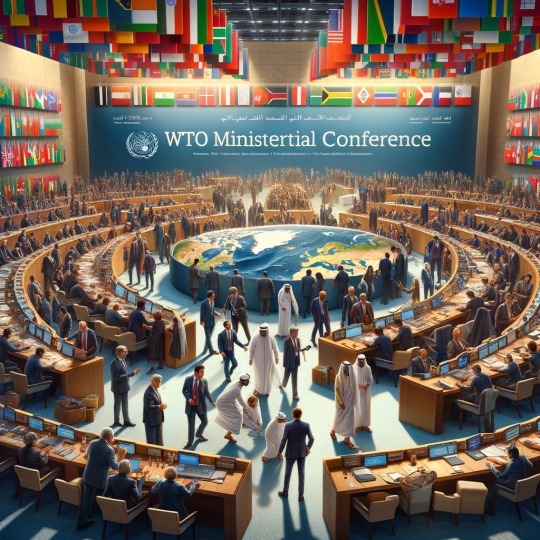
View On WordPress
#2024#agricultural policies#Common But Differentiated Responsibilities#developing nations&039; rights#distant water fishing#environmental sustainability#Exclusive Economic Zones#farm subsidies controversy#farmers&039; protests#fishing subsidies debate#food security#global economic satire#global trade battles#India&039;s trade stance#international negotiations#investment facilitation deadlock#marine resource management#multilateral trade agreements#South Africa and India collaboration#Special and Differential Treatment#sustainable fishing practices#trade and development#trade policy satire#UNCLOS#US dispute#WTO drama#WTO ministerial conference#WTO reforms
0 notes
Text
Docks Market: Tracing the Evolution and Uncovering Emerging Opportunities
The global docks market size is expected to reach USD 2.3 billion by 2030, as per a new report by Grand View Research Inc. The market is expected to expand at a CAGR of 3.4% from 2022 to 2030. The rising structure demand as the governing bodies of various economies is conducting redevelopment of waterfronts to maximize their value for both business and community, which is expected to propel market growth. Additionally, the constantly rising global population is indirectly leading to the scarcity of space in the existing urban ports leading to market demand for increasing the space productivity within a port.
One of the Norway-based engineering firms has developed smart application software to reduce the risk of accidents using an IoT platform. The newly developed technology makes use of hi-tech sensors to real-time monitor the operating states of floating docks from virtually anywhere. This newly developed application software shows the water levels across different tanks and other operating parameters for the docks which will increase the market for docks.
The Governmental permits are needed on the size of the dock, type of dock, and the type of natural resources that might get affected such as mangroves, corals, hard bottoms, and seagrass. The prohibitions are enforced on the harmful chemicals used for docks which may disturb the marine ecosystem. Lastly, some other restrictions might be added to control the type of dock being placed on the property.
The installation of docks is offered directly by the company-appointed contractors or distributors. However, the companies also offer a product suitable for DIY installations. In addition, the manufacturers also offer repair and maintenance services for the docks. The conventional port world is constantly changing, the technological, demographical, and sustainability drivers are affecting the daily business and are shaping several important trends which is also expected to drive the demand for docks market during the forecast period.
The global temperature rise is expected to make the transpolar passage and the Northern Sea Route could become potential alternatives for maritime freight. The use of the Northern Sea Route for maritime freight between Asia and Northern Europe is expected to reduce the voyage distance when compared with the Suez Canal route.
For More Details or Sample Copy please visit link @: Docks Market Report
Docks Market Report Highlights
The metal frame segment accounted for a market share of 52.0% in 2021, owing to the increasing demand for aluminum frame docks. Docks with aluminum frame are highly preferred by lakefront home or business owner as it offers strength as well as improve the aesthetic profile of the property where the dock is installed
The commercial application segment dominated the market in 2021 and is estimated to generate revenue of USD 1.1 billion by 2030, owing to the endless commercial applications for floating docks, however, they are commonly used at settings such as waterfront resorts and marinas
The market in North America is anticipated to witness a CAGR of 2.8% from 2022 to 2030 on account of increased users indulging in outdoor recreational activities that incorporate social distancing due to the pandemic. This will enhance the docks market within the region
The U.S. market is projected to witness strong growth over the forecast period and reach a market value of USD 0.68 billion in 2030 on account of the rise in the use of shipping for the movement of products and goods across regions. Additionally, space productivity is expected to lead to waterfront redevelopment activities thus positively influencing the docks market
The docks market is competitive in nature owing to the presence of several players that are primarily consolidated in the Asia Pacific and North America, whereas Europe exhibits a limited presence of established players. The changing lifestyle needs of the population, especially the younger section, towards activities such as adventure sports has also led to the rise in the use of boats and ships. This has also led to an increase in the use of floating docks across the globe
#Global Docks Market#Maritime Infrastructure#Port Development#Logistics Hub#International Trade#Shipping Industry#Dock Technology#Port Management#Water front Development#Maritime Connectivity#Harbor Innovation#Seaport Logistics#Dock Infrastructure#Naval Architecture#Coastal Development#Shipping Networks#Port Economics#Global Trade Routes
0 notes
Text
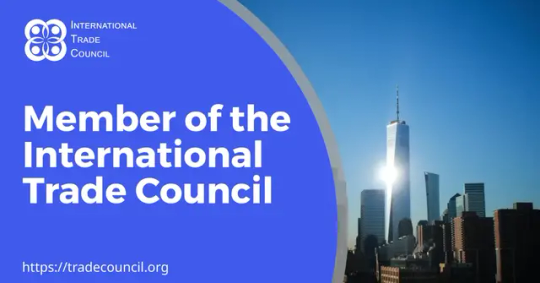
YES IT Labs LLC Joins the Distinguished International Trade Council
YES IT Labs: Leading the way in global software solutions. Partner with us to drive excellence and embrace growth in collaboration with the International Trade Council.
0 notes
Text

#Institute - The World Bank
The World Bank Group (WBG) is a family of five international organizations that make leveraged loans to developing countries. It is the largest and best-known development bank in the world and an observer at the United Nations Development Group. The bank is headquartered in Washington, D.C., in the United States.
#gentlemans code#finance#business#international finance#world bank#world bank group#world trade#developing country#institution#united nations#washington dc
1 note
·
View note